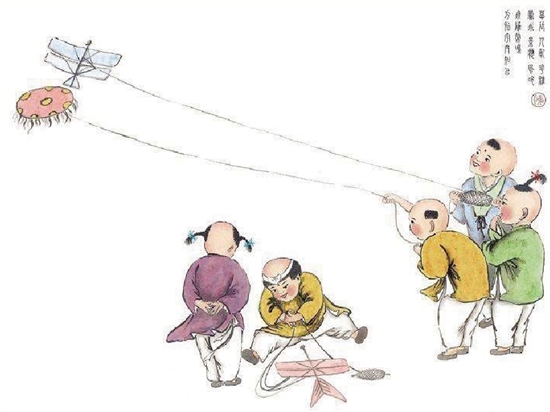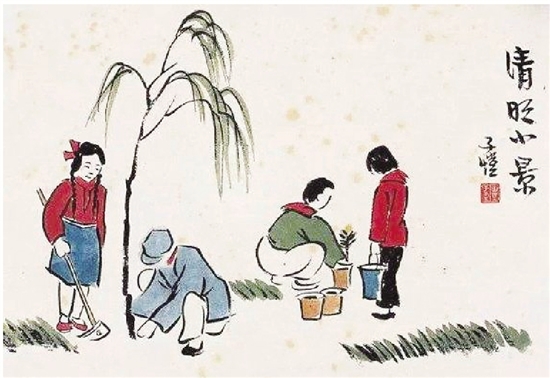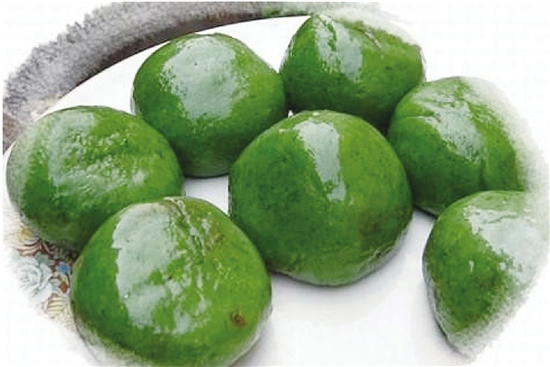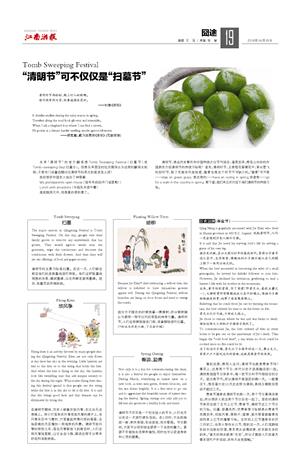Tomb Sweeping Festival
“清明节”可不仅仅是“扫墓节”
 |
 |
 |
清明时节雨纷纷,路上行人欲断魂。
借问酒家何处有,牧童遥指杏花村。
——杜牧《清明》
It drizzles endless during the rainy season in spring,
Travelers along the road look gloomy and miserable。
When I ask a shepherd boy where I can find a tavern,
He points at a distant hamlet nestling amidst apricot blossoms
——杨宪益、戴乃迭英译《清明》 (无韵译法)
Because Jie Zitui* died embracing a willow tree, the willow is believed to have miraculous powers against evil. During the Qingming Festival, willow branches are hung on door fronts and used to sweep the tombs.
因为介子推死的时候抱着一棵柳树,所以柳树被认为拥有一种可以对抗邪恶的神奇力量。清明时节,人们会将柳枝挂在门前,或拿柳枝进行扫墓。
(*标注为历史人物,下文会介绍)
历史回顾(寒食节)
Qing Ming is popularly associated with Jie Zitui who lived in Shanxi province in 600 B.C. Legend. 说起清明节,人们一定会想到历史人物介子推。
It is said that Jie saved his starving lord's life by serving a piece of his own leg.
据历史记载,在公元前600年的春秋时代,晋国公子重耳逃亡在外,生活艰苦,跟随他的介子推不惜从自己的腿上割下一块肉让他充饥。
When the lord succeeded in becoming the ruler of a small principality, he invited his faithful follower to join him. However, Jie declined his invitation, preferring to lead a hermit's life with his mother in the mountains.
后来,重耳回到晋国,作了国君(即晋文公,春秋五霸之一),大肆封赏所有跟随他流亡在外的随从,惟独介子推拒绝接受封赏,他带了母亲隐居绵山。
Believing that he could force Jie out by burning the mountain, the lord ordered his men to set the forest on fire.
晋文公无计可施,只好放火烧山。
Jie chose to remain where he was and was burnt to death. 谁知这场大火却把介子推母子烧死了。
To commemorate Jie, the lord ordered all fires in every home to be put out on the anniversary of Jie's death. Thus began the "cold food feast", a day when no food could be cooked since no fire could be lit.
为了纪念介子椎,晋文公下令每年的这一天,禁止生火,家家户户只能吃生冷的食物,这就是寒食节的来源。
看到这里,那有人会问,清明节也就是寒食节吗?事实上,这是两个节日,宋代以后才逐渐融合到一起。清明是我国节日体系中,唯一把节日和节气相结合的日子。因为是节气,所以清明不是固定的哪一天。一般情况下,每年春分后15天左右即为清明,具体日期前后变动不超过三天。
寒食节通常在清明节的前一天,两个节日离得非常近,所以很多人把这两个节日合在一起了。现在的清明节其实包括了古代上巳节、寒食节、清明节这三个节日的习俗。扫墓、祭奠先烈、吃寒食等习俗都是从寒食节发展而来,但放风筝、荡秋千、插柳、拔河等春游踏青活动则是上巳节的重要习俗。古时的上巳节通常在农历三月初三,也有人称作女儿节,每到这一天,人们成群结队到水边祭祀饮酒,青年男女谈情说爱,祈求新生命的到来。“春天的特点就是‘生发’,所以才鼓励人们在春天要多进行户外活动,多和大自然接触。”
本来“清明节”的官方翻译是Tomb Sweeping Festival(扫墓节)或Tomb-sweeping Day(扫墓日)。但是马来西亚的社交媒体认为这样的翻译太刻板,于是专门设置话题讨论清明节的英文到底该怎么说?
然后很多外国友人给出了神答案:
My grandparents open house.(我爷爷奶奶开门迎客啦!)
Lunch with ancestors.(与祖先共进午餐)
虽然脑洞大开,但是真的很形象了。
清明节,是由历史事件和中国传统文化节气结合,演变而来,那怎么向你的外国朋友介绍清明节的传统习俗呢?首先,清明时节,正是每年春暖花开,草长莺飞的好时节,除了忙趁东风放纸鸢,踏青也是这个时节不可缺少的。“踏青”可不是——step on green grass, 是这样的——have an outing in spring,或者是——go for a walk in the country in spring. 那下面,我们来正式介绍下咱们清明节的传统习俗。
The major custom in Qingming Festival is Tomb Sweeping Festival. On this day, people visit their family graves to remove any underbrush that has grown. They would uproot weeds near the gravesites, wipe the tombstones and decorate the tombstones with fresh flowers. And then they will set out offerings of food and paper money.
清明节的主要习俗是扫墓。在这一天,人们都会前往他们的家族墓地进行拜祭。他们会铲除墓地周围的杂草,擦拭墓碑,以及用鲜花装饰墓碑。然后,放置贡品和烧纸钱。
Not only it is a day for commemorating the dead, is it also a festival for people to enjoy themselves. During March, everything in nature takes on a new look, as trees turn green, flowers blossom, and the sun shines brightly. It is a fine time to go out and to appreciate the beautiful scenes of nature during the festival. Spring outings not only add joy to life but also promote a healthy body and mind.
清明节不仅仅是一个纪念故人的节日,人们也可以在这一天进行娱乐活动。在3月份,大自然焕然一新,树木变绿,花朵绽放,阳光普照。节日期间,大家可以好好地去感受一下自然的魅力。春游不仅能给生活带来愉悦,同时也可以促进身体和心灵的健康。
Flying kites is an activity favored by many people during the Qingming Festival. Kites are not only flown at day time but also in the evening. Little lanterns are tied to the kite or to the string that holds the kite. And when the kite is flying in the sky, the lanterns look like twinkling stars that add unique scenery to the sky during the night. What makes flying kites during this festival special is that people cut the string while the kite is in the sky to let it fly free. It is said that this brings good luck and that diseases can be eliminated by doing this.
在清明节期间,许多人都喜欢放风筝,无论白天还是晚上。将小灯笼系在风筝或放风筝的绳子上,当风筝在空中飞舞时,灯笼看起来像闪烁的星星,会给夜晚的天空增加一些独特的风景。清明节放风筝的特别之处,是当风筝被放飞到高空时,人们会将风筝线剪断,让它自由飞翔,据说这样可以带来好运和消除疾病。
Tomb Sweeping
扫墓
Spring Outing
春游、踏青
Planting Willow Trees
插柳
Flying Kites
放风筝
Tomb Sweeping Festival
“清明节”可不仅仅是“扫墓节”
